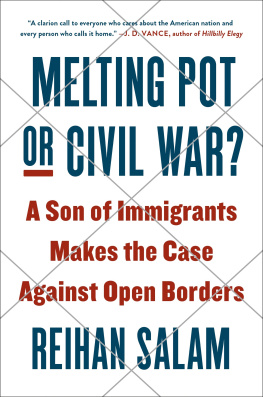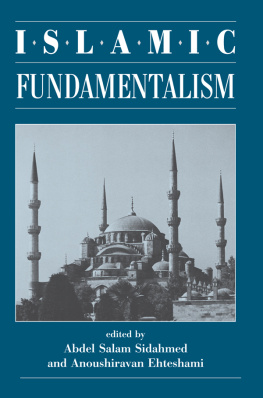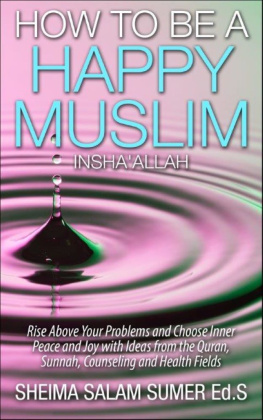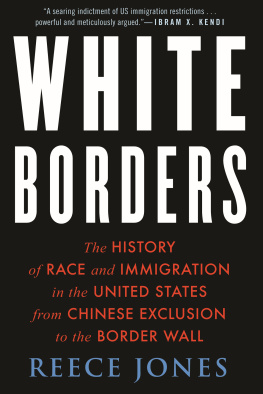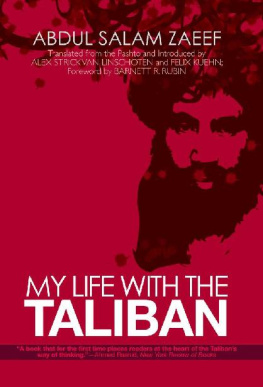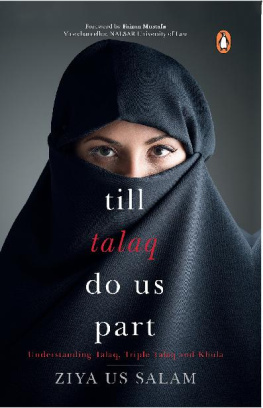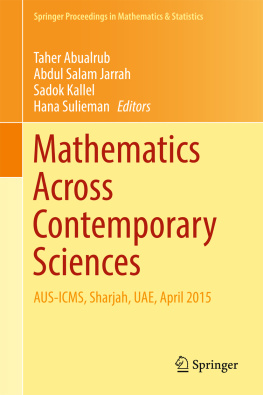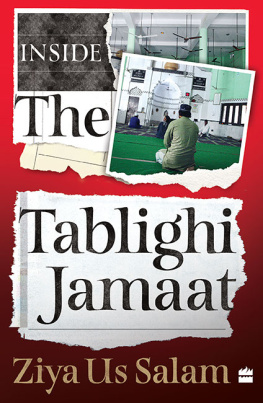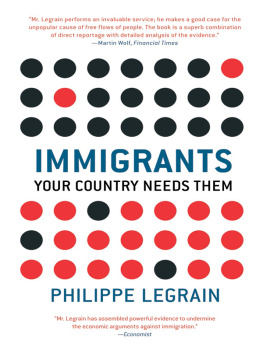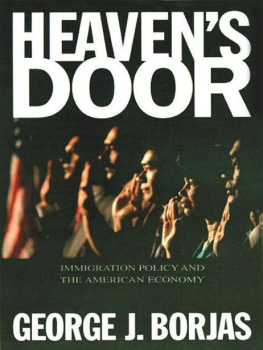
Sentinel
An imprint of Penguin Random House LLC
375 Hudson Street
New York, New York 10014

Copyright 2018 by RMS Media Consulting Inc.
Penguin supports copyright. Copyright fuels creativity, encourages diverse voices, promotes free speech, and creates a vibrant culture. Thank you for buying an authorized edition of this book and for complying with copyright laws by not reproducing, scanning, or distributing any part of it in any form without permission. You are supporting writers and allowing Penguin to continue to publish books for every reader.
Ebook ISBN: 9780735216280
Library of Congress Cataloging-in-Publication Data
Names: Salam, Reihan, author.
Title: Melting pot or civil war? : a son of immigrants makes the case against open borders / Reihan Salam.
Description: New York, New York : Sentinel, [2018]
Identifiers: LCCN 2018033512 | ISBN 9780735216273 (hardback)
Subjects: LCSH: United StatesEmigration and immigrationGovernment policy. | BISAC: POLITICAL SCIENCE / Political Ideologies / Conservatism & Liberalism. | SOCIAL SCIENCE / Emigration & Immigration. | LAW / Emigration & Immigration.
Classification: LCC JV6483 .S25 2018 | DDC 325.73dc23 LC record available at https://lccn.loc.gov/2018033512
While the author has made every effort to provide accurate telephone numbers, internet addresses, and other contact information at the time of publication, neither the publisher nor the author assumes any responsibility for errors, or for changes that occur after publication. Further, the publisher does not have any control over and does not assume any responsibility for author or third-party websites or their content.
Version_2
To my sisters
CONTENTS
Introduction
A few years ago, a cable news producer asked me to appear on his television program to discuss a grisly murder in which, if I recall correctly, a Muslim immigrant had hacked someone to death in the name of Islam. I begged off, partly because I had no special expertise in the matter. But as a professional pundit, that doesnt usually stop me: not only would I have happily discussed a swing Senate race or corporate tax cuts, but, if invited, I would also have gladly weighed in on the upcoming NATO military exercises in Romania or the latest developments in the CanadianU.S. softwood lumber dispute. Nevertheless there was something about being asked to pontificate on this particular subject that gave me pause. Did my Muslim origins somehow make me an authority on terrorist violence? My opinions on Islamic extremism were, frankly, not all that unique. There were plenty of other journalists who knew far more about homegrown terrorism than I did, so I passed a few names along and politely declined to take part myself.
Then, in December 2017, another terror attack took place, only this time the culprit was someone who looked a lot like me. Akayed Ullah, a twenty-seven-year-old man born in Bangladesh, detonated a crudely designed explosive device in New Yorks Port Authority Bus Terminal, which sees more than 230,000 commuters every day. Thankfully, Ullah injured no one but himself. His intention, however, had evidently been to take as many of those commuters with him to the afterlife as he could. No one asked me to share my thoughts on the incident, which came as something of a relief. For a while, though, I could think of little else.
In the days and weeks that followed, dogged reporters, in the United States and in Ullahs native Bangladesh, pieced together a troubling story: though not notably radical before settling in Brooklyn in 2011, the young man had come to loathe America, and to see his true home as with the Islamic State, a gang of zealots best known for its homicidal brutality. There was a sad irony in Ullahs devotion to IS. The Islamic States propaganda insisted that it had built an egalitarian paradise, where all Muslims were treated equally. In practice, while the terror group prized its European recruits and treated Arab volunteers relatively well, their African and South Asian counterparts, Bangladeshis very much included, were routinely treated as subhuman wretches. They were given the most dangerous assignments, the worst equipment, the lowest wages, and the lowest priority when it came to doling out jihadi war brides. Yet Ullah apparently concluded that innocent U.S. commuters, including any number of recent immigrants much like himself, deserved to be put to death to avenge Americas war against the Islamic State.
Why did I find Ullahs crime so affecting? For one, he lived in Kensington, the neighborhood where I grew up, and he was born in the same country as my parents. Ullah and I had shared the same stretches of sidewalk, and probably frequented the same corner stores. He settled in the country legally via a green card sponsored by a family member, not an uncommon story among Bangladeshi immigrants. When I saw Ullahs face, I saw someone who could have been a cousin, or who might have helped my mother carry an armful of groceries.
After I heard the news, I girded myself for what would come next. In the Age of Trump, all conversations about immigration descend into dueling spasms of culture-war outrage. As a poor Muslim immigrant turned lone-wolf terrorist, he was emblematic of some of the most polarizing aspects of the presidents immigration agenda. Trump had famously campaigned on banning Muslim immigrants from the United States outright, a stance that enjoyed overwhelming support among GOP primary voters. As president, he called for curbing family-based admissions on the grounds that it meant admitting millions of immigrants lacking in merit. Immigration advocates pushed back. Some argued that it was obscene to suggest that a man like Ullah was representative of immigrants at large. Others said that it was racist to question our current approach to family-based admissions.
And where was I? In an uncomfortable place. Donald Trump had built his political career on demonizing immigrants, and I sympathized with immigration advocates who resented him for it. I am not just the son of immigrants. I am the brother, neighbor, and friend of immigrants, many of whom found Trumps rhetoric frightening. To the extent I harbor stereotypes about immigrants, they are positive. Some immigrants are violent and cruel, and others are feckless and lazy, just as there are many millions of natives who suffer from similar failings. But few are, like Akayed Ullah, intent on mass slaughter. Consider that he was married to a woman still living in Bangladesh, and his wife had recently given birth to a son. She was applying for visas to join him in America. What could possibly have led him to bring such shame to his family members, and to destroy their prospects of a better life? Surely something so personal and strange as to defy generalization or some specific public policy response.
So youd think my sympathies would be with Americas growing army of open borders activists, who call for ending all deportations and adopting ever more permissive immigration policies. Many of them are Americans like me, with recent immigration in their families, and I understand where they are coming from. But I noticed a contradiction in the arguments I was hearing for more open borders, which led me to part ways with the pro-immigration activists. There is a yawning chasm separating standard-issue immigration enthusiasts, who insist with a straight face that more open immigration policies will have absolutely no negative consequences, and an emerging class of intellectuals I call the bullet-biters: serious, rigorous, thoughtful immigration advocates who recognize that if the United States is going to welcome a far larger number of low-skill immigrants, we Americans will have to transform our welfare state, and we might even have to countenance the creation of a new class of guest workers who would be permanently barred from citizenship. The bullet-biters recognize that the world of the 2020s and 2030s will be drastically different from the world of the 1890s and 1900s, not least because the number of potential migrants to America will have greatly increased, and they forthrightly acknowledge that open borders and domestic equality simply cant coexist. Their position, in essence, is that by welcoming millions of low-skill workers whod never be in a position to enter the U.S. middle class, we would greatly reduce

